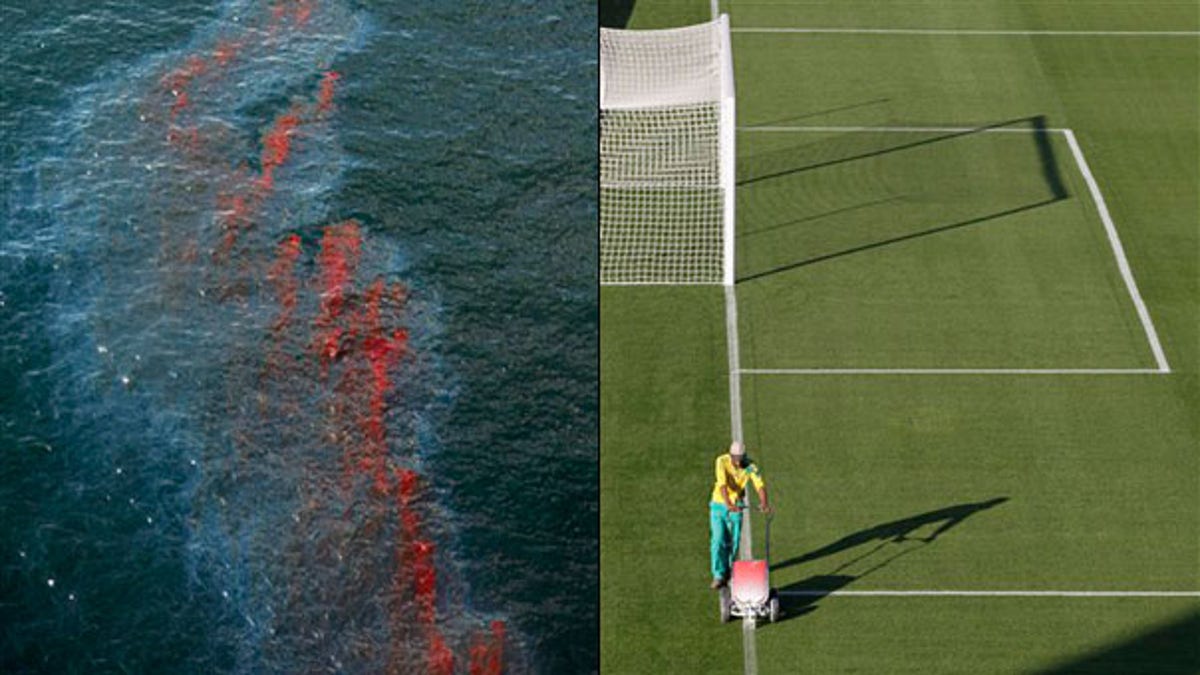
(AP Photos)
When the United States drew England last December as its opening round competition in the World Cup, it should have set the stage for a friendly rivalry of English superstars against American upstarts.
But the BP oil spill and the subsequent American outrage against one of Britain's most prominent industrial giants has turned the match into somewhat of a proxy battle for the finger-pointing over the worst environmental disaster in U.S. history.
President Obama plans to speak with British Prime Minister David Cameron on Saturday in what will surely be a diplomatic dance as Cameron faces pressure from his electorate to push back on the BP browbeating. Thousands of miles away, that dance will be a stomp as the U.S. team squares off against England in South Africa.
Tensions in both countries have flared over BP, injecting the soccer face-off with an added layer of competition. The opportunity for revenge and shin-kicking has not gone unnoticed.
On the U.S. side, director Spike Lee -- who's been on the vanguard of outrage over the spill -- reportedly told a gathering of New York bloggers the U.S. team should wear shirts that say "BP Sucks" on Saturday. A Facebook page calling for BP "payback" hopes against hope that "our boys will get some retribution in South Africa."
In Britain, newspapers and politicians on Friday slammed the Obama administration's treatment of the company. The timing of the match fed the fire.
The Times of London ran a cartoon that showed soccer player Obama "booting" a ball with a BP logo on it. His uniform showed the president was sponsored by "Mid Term Elections Inc."
Facing public pressure, Obama has taken a tougher tone toward BP in recent days.
He said earlier in the week that he'd fired BP CEO Tony Hayward and claimed that he was scouting for an "ass to kick." U.S. senators called on BP to stop dividend payments, and House Speaker Nancy Pelosi echoed that call on Friday.
Times Editor James Harding told Fox News it sends a troubling signal when the president is in "ass-kicking mode."
"It doesn't help anyone when you start getting personal," he said.
Officials insist things aren't that bad.
Martin Longden, a spokesman for the British Embassy in Washington, said there's a "huge amount of understanding for where the administration is here" and that the match is unrelated.
"I don't think the two do play into each other in any meaningful way," he said.
Does that mean there's no sense of rivalry? Of course not. The Embassy is opening up its doors to staff members, families and a few "football aficionados" to watch the game Saturday -- the American staff members are invited, but only so they can be shamed.
"They want them to be there to witness England's triumph," Longden said.
Nile Gardiner, director of The Heritage Foundation's Margaret Thatcher Center for Freedom, said the BP issue has developed into a "major confrontation" between London and Washington. But he said the rage is mostly political and that the relationship between the American and British people will remain strong.
"You are going to see that in the aftermath of tomorrow's World Cup match, no matter what the result," he said. Gardiner, who came to the United States from Britain eight years ago, will be rooting for England.




